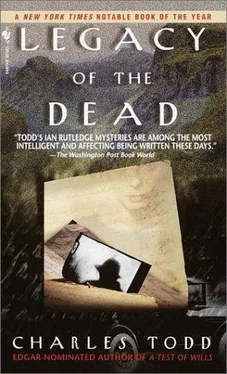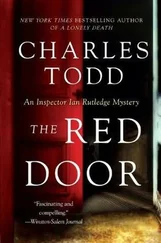Charles Todd - Legacy of the Dead
Здесь есть возможность читать онлайн «Charles Todd - Legacy of the Dead» весь текст электронной книги совершенно бесплатно (целиком полную версию без сокращений). В некоторых случаях можно слушать аудио, скачать через торрент в формате fb2 и присутствует краткое содержание. Жанр: Полицейский детектив, на английском языке. Описание произведения, (предисловие) а так же отзывы посетителей доступны на портале библиотеки ЛибКат.
- Название:Legacy of the Dead
- Автор:
- Жанр:
- Год:неизвестен
- ISBN:нет данных
- Рейтинг книги:5 / 5. Голосов: 1
-
Избранное:Добавить в избранное
- Отзывы:
-
Ваша оценка:
- 100
- 1
- 2
- 3
- 4
- 5
Legacy of the Dead: краткое содержание, описание и аннотация
Предлагаем к чтению аннотацию, описание, краткое содержание или предисловие (зависит от того, что написал сам автор книги «Legacy of the Dead»). Если вы не нашли необходимую информацию о книге — напишите в комментариях, мы постараемся отыскать её.
Legacy of the Dead — читать онлайн бесплатно полную книгу (весь текст) целиком
Ниже представлен текст книги, разбитый по страницам. Система сохранения места последней прочитанной страницы, позволяет с удобством читать онлайн бесплатно книгу «Legacy of the Dead», без необходимости каждый раз заново искать на чём Вы остановились. Поставьте закладку, и сможете в любой момент перейти на страницу, на которой закончили чтение.
Интервал:
Закладка:
The Somme offensive of 1916, a disaster from its inception, had begun in July and dragged on through the summer. So many men had died that the bodies corrupted and rotted where they lay and the survivors lived with the stench. Weeks into the battle, they were none of them quite sane, but when Corporal Hamish MacLeod cracked, the shock of it left Rutledge and his men staring.
There had been no sign, no warning. Taking over from a gut-shot and dying sergeant, MacLeod had led his men with extraordinary skill and bravery, an example to them all. When he abruptly refused to make another assault on the machine-gun nest that was their objective, there was stunned disbelief.
Orders had come down that the gun had to be silenced before the entire line went over the top at dawn. Artillery fire, laid down in earnest during the night, had deafened them, battered them until they were all on the ragged edge of despair. And still the machine gunners survived, because they were well dug in and no one could reach them through the hail of bullets.
As the weary, white-faced corporal shook his head, refusing a direct order, saying only “I willna’ kill any more of our own. I willna’ go back again. It’s madness,” the eyes of the men at his back were grim, disheartened.
Rutledge didn’t know how he and Hamish had come through each assault unscathed. He didn’t know where he himself would find the strength to go back through the wire a sixth time. But there was no choice. One machine gun had the firepower of forty men. It could take down an entire line. It had to be put out of action.
Rutledge reasoned with Hamish, threatened him, called on his patriotism, and the silent Highlander had merely shaken his head. But his face pleaded for understanding even as it reflected the grief and torment in Rutledge’s.
In war there is no time for compassion. No time for mercy. To save a thousand lives, one had to be sacrificed. Rutledge gave Hamish an ultimatum. Be ready in an hour’s time for the next attempt, or be shot for cowardice.
Hardly cowardice. But that was the name the Army gave it when men broke under fire.
In the end, Rutledge had had to carry out his threat. In the darkness before dawn, a hastily drawn-up firing squad had shot Corporal Hamish MacLeod. And as Rutledge had delivered the coup de grace to the badly wounded Highlander, the salient had been blasted out of existence by a German shell. Buried alive, blinded, and deaf, Rutledge had lived only because Hamish’s body had protected him. A bitter irony…
And the machine gunners had died as well, for which Rutledge, disbelieving, had been given a medal and sent back into the fighting as a bloody example. Without rest or respite: the war needed men.
As the hellish summer of 1916 dragged into agonizing stalemate for two more years, Rutledge had carried out his duties barely aware of anything except the incessant voice of Hamish in his head. He had wanted to die, had tried to die, and in spite of war and pestilence, he had lived. To come home a hero. To come home a man hardly able to speak. Bringing a dead man with him.
The doctor, Fleming, had done his work well. In June 1919, Rutledge had returned to the Yard, declared fit for duty. His secret went with him. Not even Frances knew how much it had cost Rutledge to struggle back to his former skills. A murderer standing in judgment of murderers. Nor had Hamish made it easy, standing constantly at his shoulder and condemning him. They had worked out, in time, a relationship that was more a stalemate than anything else. It was only that when he, Rutledge, was most vulnerable, Hamish was the first to sense it. As if, Rutledge sometimes thought, the dead man had taken his revenge.
Not even Fleming, with all his medical skills, could wipe out memory. Or guilt.
Cold comfort on a dark, rainy night of bad dreams and a haunting voice from the trenches.
After a time, Rutledge made himself go back to his bed, draw the sheets over his shoulders again, and close his eyes.
But when the September dawn broke grayly over London, he hadn’t slept.
In the light of day, Rutledge could pin down with some certainty what had precipitated the dream. It was the letter that had arrived in the previous morning’s post. He hadn’t opened it for several hours, knowing who it was from and what it demanded of him. Finally, after it had seemed to burn a hole in his coat pocket as well as his conscience, he had taken the letter out and broken the ornate seal.
His godfather, David Trevor, had written from Edinburgh, saying,
You’ve made a dozen excuses. Don’t make another one. Come to see me. I miss you, Ian, I want to see for myself that you’re alive and well. If that grim devil Bowles won’t give you leave, come anyway. My doctor will tell him you need a rest. And for that matter, so do I. Loneliness is the very devil!
But Scotland was the last place Rutledge intended to go. The love and duty he owed his godfather were very real, but so was his reluctance to go north of the border, which seemed in the clear light of day an almost superstitious dread, but in the dark seemed an unbearable, unspeakable burden. Not because he hated the Scots but because so many of them had been under his command in France-and he’d led so many of them to their death. He could name every one of them, even the raw recruits he’d known for less than a day.
And leave was the last thing he wanted. Tired as he was, idleness was worse. When a man was idle, his demons marched like ghostly armies in the forefront of his mind.
Chief Superintendent Bowles would have been glad to grant Rutledge leave if he had asked for it. The less he saw of the Inspector, the happier Bowles was. The closed door of his empty office was like a benediction when Bowles passed it each day that Rutledge was away from London. Rutledge underfoot was a constant reminder of things best forgotten. Clever men always disturbed Bowles’s peace of mind, and clever men with good accents, men who’d been to university or moved comfortably in circles where Bowles, for all his authority, felt stiff and clumsy, were intolerable. Bowles made it a point to rid himself of such men as fast as he could. There were subtle ways to convince a clever man that it was in his best interests to ask for a transfer.
But Rutledge, damn and blast him, seemed to lead a charmed life. He had survived the bloodbath of the Somme, he’d survived wounds, he’d survived months in hospital. And if Bowles’s informant was telling the truth, Rutledge had been half out of his head, broken and silent, hardly a promising future. Yet for four months now he’d survived Bowles’s concerted attempts to show him up as inept and lacking his pre-war skills.
To Bowles’s way of thinking, England would have been better served if Rutledge had died with the rest of what the writers were now calling The Flower of English Youth. Dead “flowers” could be swept up with the rubbish and forgotten. Live challengers to his ambition were fair targets.
Bowles had climbed the ladder as far as his ability allowed, buoyed by some small success hunting German spies during the Great War. But it appeared he was destined to retire as a Chief Superintendent. Climbing higher was out of the question for a man of his station. And that knowledge was a constant goad to his anger and frustration.
He found himself this gloomy morning walking into Rutledge’s office and dragging the other chair from where it was usually kept near the wall, out of the way of the door. Sitting down heavily, he slapped a file on the desk.
“There’s a spot of trouble in the north, close by Durham, and it seems you’re wanted to handle it.” He opened the file, reached for a sheet of paper with a dozen paragraphs scrawled across it in heavy ink, and scowled at it. “Here’s the long and short of it. And the reports to confirm it.”
Читать дальшеИнтервал:
Закладка:
Похожие книги на «Legacy of the Dead»
Представляем Вашему вниманию похожие книги на «Legacy of the Dead» списком для выбора. Мы отобрали схожую по названию и смыслу литературу в надежде предоставить читателям больше вариантов отыскать новые, интересные, ещё непрочитанные произведения.
Обсуждение, отзывы о книге «Legacy of the Dead» и просто собственные мнения читателей. Оставьте ваши комментарии, напишите, что Вы думаете о произведении, его смысле или главных героях. Укажите что конкретно понравилось, а что нет, и почему Вы так считаете.












